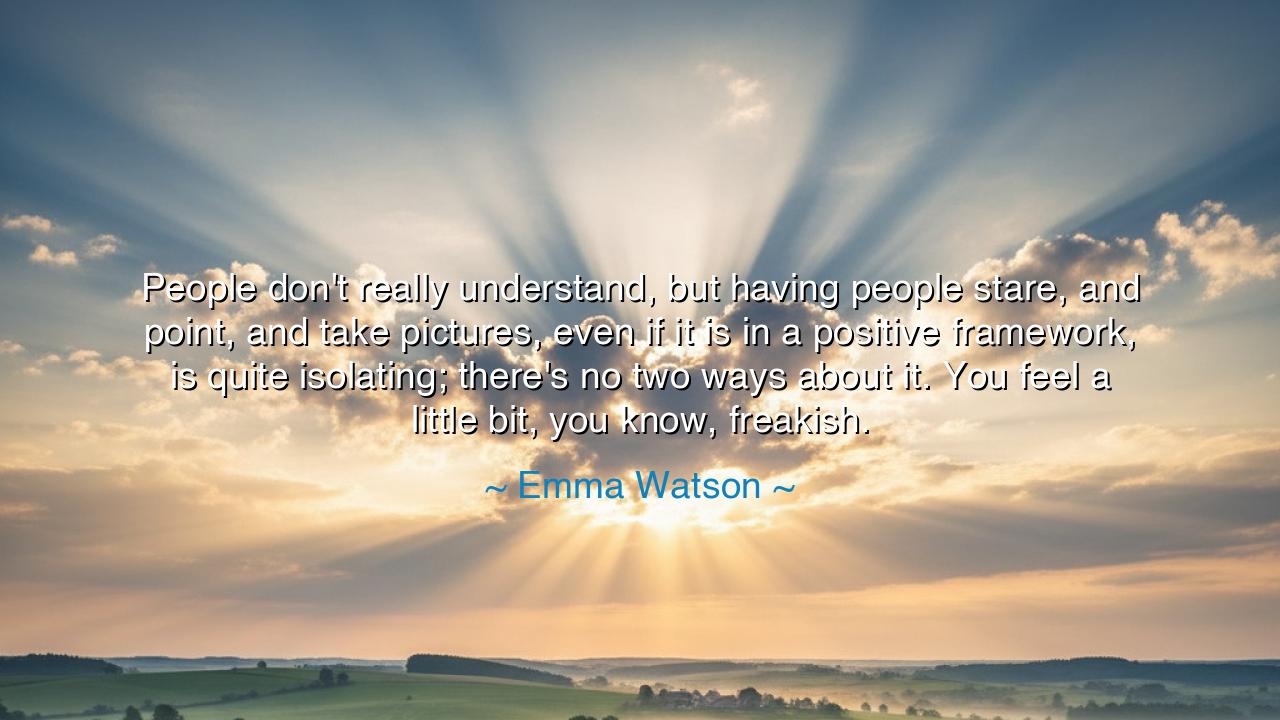
People don't really understand, but having people stare, and
People don't really understand, but having people stare, and point, and take pictures, even if it is in a positive framework, is quite isolating; there's no two ways about it. You feel a little bit, you know, freakish.






Hear the words of Emma Watson, spoken with the honesty of one who has walked beneath the blinding gaze of the world: “People don’t really understand, but having people stare, and point, and take pictures, even if it is in a positive framework, is quite isolating; there’s no two ways about it. You feel a little bit, you know, freakish.” These are not words of complaint, but of revelation. For they unveil the hidden loneliness of fame, the strange exile of being seen by all yet known by none.
The origin of this saying lies in Watson’s own life. From her earliest years, she was cast into the global spotlight as Hermione Granger in the Harry Potter films. While millions adored her, the constant stares and the unceasing flash of pictures created a prison of visibility. What others saw as admiration, she often felt as surveillance. The paradox of her existence was this: celebrated by the many, yet separated from the intimacy of the few. Her words reveal that even positive attention, when constant and relentless, can wound as deeply as criticism.
History too knows this paradox. Consider Princess Diana, beloved by millions yet hounded by cameras until her final breath. The same crowd that praised her grace became the mob that stole her privacy. Or recall the Roman gladiators, cheered by roaring arenas yet enslaved by their fame, their lives controlled and consumed by the public’s gaze. Such figures remind us that admiration, when it strips away humanity, can become as cruel as scorn.
The deeper meaning of Watson’s words is that the human soul longs not merely to be seen, but to be understood. Staring and pointing reduce a person to an object—an image to be consumed rather than a being to be cherished. Even when clothed in positivity, this gaze creates distance, making the admired feel like an exhibit rather than a companion. Thus, what should be a blessing becomes a burden, what should be connection becomes isolation.
The lesson for us is clear: admiration must never come at the cost of humanity. To truly honor another is not to invade their space, but to respect their boundaries. The freakish feeling Watson describes is the soul’s cry against dehumanization, even when disguised as praise. For dignity is not preserved by applause, but by the quiet recognition that behind the image stands a living, breathing person, fragile like all of us.
To the youth, I say: do not envy fame without also seeing its chains. To admirers, I say: if you love a figure, grant them not only your respect but your restraint. To all, I say: let your gaze upon others be filled with compassion, not possession—look not to consume, but to understand.
Practical action lies before us: when encountering those in the public eye, resist the urge to reduce them to spectacle. Honor their humanity by offering space, kindness, and respect. And in daily life, remember that even those outside fame long to be seen not as objects but as souls—friends, neighbors, family who deserve to be known in truth, not in surface image.
Thus Emma Watson’s words endure: “Even in a positive framework, it is quite isolating.” They are a reminder to every generation that to stare is easy, but to truly see is rare. Let us then learn not merely to admire, but to respect; not merely to celebrate, but to protect. For only in this way can admiration become a gift, not a burden, and attention become a bond, not a cage.






TTHong Diep Tran Thi
Emma Watson’s words shed light on an issue that many people overlook—the emotional toll of public attention, even if it's positive. Could there be a better way to appreciate someone without making them feel like an object of curiosity? How can society shift its mindset to show admiration without crossing personal boundaries?
TBVu Tien B7.037.
I can relate to this quote in some ways, especially the idea of feeling like a spectacle. Even when the attention is meant to be positive, it seems impossible not to feel exposed. How can we better support public figures in a way that respects their privacy while still acknowledging their achievements?
HHaMie
This quote resonates with the idea that even positive attention can be overwhelming. How does someone navigate being constantly in the spotlight without feeling objectified or like they’re losing their personal space? How can society show more empathy toward those in the public eye?
DTha duc tri
It’s interesting how Emma Watson highlights the feeling of isolation despite the positive intentions behind the attention. Can we truly separate the intention behind the gaze from the effect it has on the person being observed? Is it possible for someone in the public eye to ever feel truly 'seen' without feeling exposed?